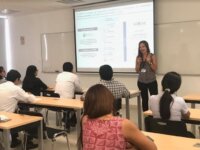Lisbon City Council is one of the 10 largest public purchasers in Portugal. The relevance of public procurement in the municipal activity led to the development of an internal portal - the Collaborative Purchasing Portal - to bring together all those who work in this area. With this Portal, the Lisbon City Council intends to foster an environment of trust, knowledge and sharing, and to strengthen the mission of its workers and the ties that unite them in a digital environment.
Innovation Tag: Procurement/Acquisitions
Case Study
Procurement Planning Platform (PPP) for driving Sustainability, Circularity and Innovation in Lisbon…
Lisbon Municipality aims for more innovation and sustainability in Public Procurement. Urgency and specifications' complexity are excuses for not considering sustainability in tenders and barriers to attracting innovative SMEs and startups. The innovative approach involved users designing and developing the Procurement Planning Platform, using a rapid development tool, cloud-based, and agile methods, which selects and supports a project-led approach for deploying new procurement strategies.
Satellites collect images that can be used to identify deformations of infrastructure at millimetre level with InSAR analysis. This project investigates the use of InSAR in the monitoring of deformations of bridges. Can InSAR be of added value for a structural health assessment of bridges which, with aging assets over the largest part of Europe, becomes more and more critical? Nowadays the monitoring of bridges is very labour intensive and often not without danger. InSAR may reduce this.
In May 2021, the Municipality of Ate, was facing issues with their service to its neighbour's due to the Covid-19 pandemic. Because of this, our strategic partner FEMULP connected us with Ate, area that requested GovLink the implementation of a pilot to perform public opinion poll, in order to gather relevant information para about priority issues for the community, so as to improve the municipal responses facing the Covid-19 and focus the attention on women to generate a solidarity economy.
The City of Seattle spends over $720 million every year. With the surge of COVID-19, small businesses were left in a highly vulnerable position, forcing many to shut down. This is especially true for women and minority-owned small businesses (WMBEs). We worked with the City to launch its e-commerce government marketplace, providing a platform for government buyers to seamlessly find local WMBEs, access their products and services, obtain quotes, and check out with a few clicks.
The Environment Agency has a responsibility to protect communities from flood and coastal risks. In the past, the agency has struggled to scale their public engagement and reach their diverse audiences, while also retaining a local relevance. Hello Lamp Post was brought on to provide an interactive, live 24/7 conversational channel to educate and inform the public on flood safety, in high-risk locations around the South West of England and Newcastle.
Since 2020, the City of Austin (COA) and the University of Texas (UT) have collaborated on over twenty diverse research projects under the legal and administrative framework of a five-year, ten million dollar master interlocal agreement (ILA). Among a very few of its kind in the USA, this ILA is an "innovation enabling innovation" that bridges the barriers between two large, extremely complex organizations and fast-tracks the launch of research and innovation projects by four to five times.
A problem for companies and owners of companies is that they need to engage with many different authorities to conduct their business. Instead of building solutions in a siloed approach we aim to build into the ecosystem by integrating different actors and enabling the business to control their own data using blockchains and digital wallets. This is both a new approach and use of a combination of new technologies that benefits the companies.
Government struggles to exploit advances in science and technology that could improve public services. The UK Home Office developed a new, cost-effective model to enable start-ups, Small and Medium-sized Enterprises (SMEs), not-for-profits and academia to solve frontline challenges across UK government using diverse, cutting-edge capabilities and expertise. Uniquely, for UK public sector, it uses flexible, novel ways of working and commercial mechanisms to deliver mission impact at pace.
Procurement organizations have limited resources and decide which procurement solutions to pursue that will bring the greatest benefit to their public sector customers. The Emerging Markets initiative solicits insights directly from the private sector, offering an opportunity to provide ideas that are innovative and forward thinking, to anticipate and proactively meet the needs of multiple governmental entities throughout the country.




